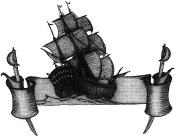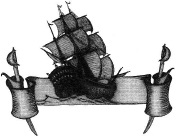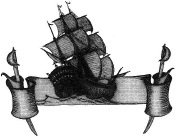Peter and the Shadow Thieves (31 page)
Read Peter and the Shadow Thieves Online
Authors: Dave Barry,Ridley Pearson
Tags: #Juvenile Fiction, #General, #Action & Adventure

AT LAST
A
S PETER RAN DOWN the path into Kensington Gardens, Tink flew alongside his right ear, silent for a change, happy to be released from the aromatic confines of Peter’s shirt.
Peter repeated the smal man’s directions to himself.
Second path to the right.
He crossed one path, then—emboldened by the darkness enveloping him—jumped and swooped upward, flying now, squinting ahead to see….
And there it was: the second path.
Peter and Tink veered right, rising even higher. To their right, Peter saw a large oval pond and, looming in the distance, the massive form of Kensington Palace. Flying faster now, they crossed a broad expanse of lawn to the south of the palace. Just ahead loomed the mansions lining Kensington Palace Gardens, their windows glowing yel ow in the deepening night fog.
As he drew near the end of the path, Peter slowed and settled quietly to the ground next to the wide, gently sloping street. To Tink’s dismay, Peter snatched her and once again tucked her under his shirt. He hesitated, taking in his surroundings, then decided to keep to the opposite side, away from the streetlights. He trotted past one huge home after another, looking for…
A white house with two towers.
There!
He saw it. Just ahead and across the street: a grand white mansion with a square tower at each end.
Mol y’s house. At last!
“Tink,” he whispered excitedly. “We found it!”
Oh, hooray,
came the bel s, muffled and distinctly unenthusiastic.
Peter started forward, then hesitated. Should he just knock on the front door in his bedraggled, filthy condition? If he did, wouldn’t a servant just turn him away? Perhaps it would be better to fly and try to find Mol y’s window and tap on it. Peter studied the house: it had a great many windows. Too many. He would try the front door first. If that didn’t work, he’d think of something else.
He took another few steps, then stopped again as he saw the distinctive form of a man standing in shadow near the streetlight in front of the house. The man was no pedestrian: he stood rock-stil , facing the street.
A guard,
Peter thought.
Peter watched the man for a moment, trying to think of a plan. He decided that he would simply walk past him. If the man stopped him, Peter would say he had an important message for Mol y Aster. If the man refused to let him pass, Peter would leave, then fly back into the darkness and try to find Mol y’s window.
Taking a deep breath, Peter began walking toward the man, but stopped and quickly retreated as he heard the clopping of hooves coming up the street toward him.
A cab rumbled out of the darkness into the glow of the streetlamp. It stopped across from the Aster house. The cab’s door opened, and a man stepped out.
Peter gasped.
It was Slank.

VISITORS
M
OLLY SAT AT HER writing table, which was iluminated by a single oil lamp sitting next to her open diary. She dipped her pen into the ink bottle and stared at the blank page, but found herself unable to form a meaningful sentence from the bits and pieces of random thoughts and vague fears swirling around her mind.
She and her mother, weary after a day of worry and suspicion, had retired early—Mol y to her bedroom in the south tower, Louise to her room on the third floor. They had agreed that each would waken the other if she heard anything odd in the night—although Mol y doubted that she would sleep any time soon.
She jumped as a sharp knock shattered the silence. Composing herself, she put down her pen, rose, and went to the door and opened it. She expected to see the familiar face of Sarah, who came around each evening to tend Mol y’s fireplace. Instead, she found herself looking into the intense, narrow-set eyes of Jenna.
“What is it?” Mol y said coldly.
“I’m here to fix the young lady’s fire for the night,” replied Jenna, with an equal lack of warmth.
“Where is Sarah?”
“She’s not feeling wel .”
“What’s wrong with her?”
“Oh, she’l be fine; the young lady needn’t worry about her,” said Jenna, in a tone that, to Mol y’s ears, sounded oddly amused.
“I see,” said Mol y uncertainly. She stood aside and watched as Jenna went to the fireplace, removed some ashes, then scooped a few coal lumps from the scuttle and added them to the glowing pile in the fireplace. When she was done, Jenna turned to Mol y and said, “Wil there be anything else, m’lady?”
“No, thank you,” said Mol y.
Jenna crossed the room and paused, her hand on the doorknob. She stared at Mol y with an intensity that made Mol y quite uncomfortable.
“Yes?” said Mol y.
“Nothing, m’lady,” said Jenna.
“Then good night,” said Mol y.
“And a very pleasant night to
you,
m’lady,” said Jenna, with a smile so unpleasant, so openly hostile, that Mol y took an involuntary step back. Then Jenna swung the door shut so hard that the breeze made the lamp flame flicker in its glass chimney.
Mol y stood there for a moment staring at the door, her breath coming in shal ow gasps, trying to calm herself. Should she tel her mother what had happened? But what actual y
had
happened? What was there to tel ? That she didn’t like the way Jenna had
smiled
at her?
Chastising herself for being such a ninny, Mol y went back to staring at her diary. It was useless; she was too upset to write. She rose and went to her window, pushing the curtain aside and looking down at the street.
She tensed: there was a cab outside, and men were getting out. Given the darkness and the distance, their features were indistinct:
one…two…three men.
They alit from the cab not twenty feet from the stout form of Mr. Jarvis, who stood beneath the streetlight. But rather than approach the men, Jarvis remained at his post, motionless. If he saw them, he gave no indication of it.
Odd.
Mol y knew she must tel her mother about the visitors. She was about to turn away from the window when one of the men moved closer to the streetlight. Just for an instant, Mol y caught a partial glimpse of this man’s face. Her heart froze; her mind raced back to a rowboat off Mol usk Island and the brutal man who had taken her captive, only to be outwitted by Peter. Was this the same man? The man she’d last seen being pushed out to sea by mermaids, his face contorted by rage and hatred?
Was this
Slank
? Could it possibly be?
Mol y pressed her face to the cold windowpane, trying to get a better look. Four men had now emerged from the cab. A fifth was descending from the doorway. Like the others, he offered little more than a featureless silhouette, yet he appeared somehow darker, and he moved differently—a floating, graceful motion. Mol y recognized him as the strange figure she had seen the night before.
The dark figure—he looked as if he were wearing some kind of robe—raised his right arm and gestured toward Mr. Jarvis, summoning him. To Mol y’s surprise, Jarvis walked over, though slowly, and stood in front of the dark figure, his head bent submissively, apparently listening. After a moment, he nodded. He unlocked and opened the gate for the others, then trudged toward the side of the house.
Whoever this dark man was, he was clearly giving orders to Mr. Jarvis, who had now left the front of the house unguarded. Mol y had to warn her mother immediately. She turned from the window, strode quickly across the room, and opened the door.
And screamed.
Jenna stood in the doorway. It was as if she hadn’t moved.
But she must have moved.
Because now she was holding a knife.

SOMETHING ODD
J
ARVIS WALKED STIFFLY, like a soldier marching to a drum only he could hear, along the carriageway on the north side of the Aster mansion. A few yards behind him glided the dark form of Ombra.
The other men—Slank, Nerezza, Gerch, and Hampton—remained by the front gate with the cab. The cab driver sat stil , staring straight ahead; his shadow had encountered Ombra an hour earlier.
Jarvis reached the far corner of the house and turned left, toward the back door. The only sounds were the occasional whinny of a distant horse and the cold wind rustling the tree branches.
“Cadigan,” Jarvis cal ed softly.
Cadigan’s hulking form emerged from the shadows. He drew on his pipe, his expressionless face il uminated for a moment by the red glow of the tobacco, then faded back into the darkness.
“Has she taken care of the staff?” Jarvis said, his voice low.
“Sleeping like babies.”
“What about the lady and the girl?”
“In their chambers.”
“He wants you to cal Hodge outside.”
“Aye.”
“You’re to lead him here, where we’re standing,” Jarvis said. “Make sure you leave the door open. And make sure your shadow ain’t touching his.”
“Aye.”
“Do it, then.”
Jarvis melted into the darkness. Cadigan opened the door and cal ed for Hodge, who appeared half a minute later. He was a big man, even bigger than Cadigan, with shoulders that fil ed the doorway.
“What is it?” Hodge said.
“Something out here I want you to see,” said Cadigan.
Hodge stepped out, fol owed by Hornblower the dog, who growled at Cadigan. Hodge started to pul the door closed behind him; as he did, Cadigan, sidestepping Hornblower, stepped forward and blocked the door, pushing it back open and sticking his head into the kitchen as if looking for someone. “Any of the staff around?” he said.
“I told you earlier: they al went to sleep early tonight,” said Hodge, annoyed at having to repeat himself.
“Al right, then,” said Cadigan, coming back out, but leaving the door open.
Hodge was about to say something when Hornblower began barking and ran toward the corner of the house.
“Hornblower!” shouted Hodge. “Come back here!”
The dog ignored him, barking furiously as it rounded the corner.
Suddenly the barking stopped.
“Hornblower!” shouted Hodge.
A few moments later, Hornblower reappeared, walking slowly, stiffly. The dog passed Cadigan, but did not growl, or even appear to notice him. It also ignored Hodge, who frowned as the dog walked past him and into the house. Hodge then turned to Cadigan and said, with more than a little irritation in his voice, “What do you want?”
“I was wondering,” said Cadigan, moving around to Hodge’s right, so that Hodge had to turn to keep facing him, “if you noticed anything odd about Jarvis.”
“What do you mean?” said Hodge, who in fact thought that both Jarvis
and
Cadigan had recently been acting odd. The door was now to Hodge’s left; his back was toward the corner of the house, and thus he did not see the dark figure rounding the corner, coming toward him.
“What I mean,” said Cadigan, “is that I’m a bit troubled by his general lack of comportment.” Hodge scowled. “What are you talking about?” he said.
“What I mean to say,” said Cadigan, “and I don’t in no way mean to imply this for certain, but, judging from my own reconnaissance, if you wil , it seems to me that Jarvis has been displaying a certain lack of procedural rectitude, if you fol ow me.”